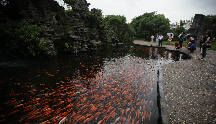Inter-party Relations Promote Sino-African Strategic Partnership
Sharing Experience
High-ranking CPC leaders, including those from the Politburo Standing Committee of the 16th and the 17th CPC Central Committees, have led delegations on frequent visits to African countries. Standing Committee member Li Chang-chun made three visits to Africa in 2005, 2008 and 2011. The 10 countries he visited included Sudan, Namibia, Tanzania, South Africa, Algeria, Mauritania, Morocco, Tunisia, Mozambique and Kenya.
Moreover, many members of the Politburo and secretaries of the Secretariat of the 16th and 17th CPC Central Committees have led delegations to visit Africa. Each year the CPC sends 10 delegations, led by provincial/ministerial leaders. The CPC also invites around 20 senior delegations from African political parties to visit China every year. President Zuma of South Africa, President Pohamba of Namibia and President Guebuza of Mozambique all led such delegations before they assumed their presidencies.
In June 2008 when President Zuma, leader of the ANC, visited China he proposed to Chinese President Hu Jintao that the CPC organize training workshops for senior members of the ANC. President Hu responded to the request immediately and soon a plan was hammered out. Since then 56 senior ANC leaders in four batches have participated in workshops on the theories and experience of the ruling parties of China and South Africa.
During the visit by the first ANC delegation to China in November 2009, Zhou Yongkang, a member of the CPC Politburo Standing Committee and the secretary of the Central Political and Legislative Affairs Committee, met with members of the ANC and discussed various topics with them. Cyril Ramaphosa, leader of the delegation and former general secretary of the ANC, said: “It is not long since the ANC was founded and became a ruling party, but the CPC has been a ruling party for six decades, and has accumulated rich experiences. We would like us to learn from each other. Every participant studied hard and had deep discussions and they admitted they gained a lot.”
In October 2011, Gwede Mantashe, general secretary of the ANC, led the fourth delegation of ANC members to China. While meeting with Xi Jinping, China’s vice president and member of the CPC Politburo Standing Committee, Mantashe said that all the delegation members are happy to visit and study in China and that they admire the achievements made by the CPC in leading its people in the country’s construction. The experience and theories of the CPC, he added, are worth learning.
Other than the ANC, parties such as the Ethiopian People’s Revolutionary Democratic Front and the Zimbabwe African National Union – Patriotic Front also send their senior members to visit and study in China. The CPC and African political parties share the same wish to understand and learn from each other. African political parties, especially those ruling parties, hope to learn the experience of the CPC in party building and country construction. Many parties explicitly say that they want the CPC to train their senior leaders.
The CPC has also carried out research into the experiences of African ruling parties that have a long history in order to improve its own party building in the new era. In recent years, the number of African party members that come to China to visit or study has increased and it is expected to welcome 750 arrivals in 2012. They take part in workshops of different types and topics, including party building, economic development, poverty reduction, young people and women. The CPC also sends experts to some African countries at their request to brief them about China and the experience of the CPC.
Promoting Traditional Sino-African Friendship
With the older generation of leaders leaving the political arena, it has become a common task for young politicians of both sides to continue the Sino-African friendship. Sam Nujoma, the first president of Namibia, went to China to receive political and military training while fighting for national independence. He has visited China 17 times and has a deep affection for the country. During his latest visit, he said to Chinese leaders that the Namibian people had forgotten the names of the Chinese teachers who trained Namibian freedom fighters. He emphasized the need to document this history and pass it down to the younger generation.
According to the proposal of Namibia’s South West Africa People’s Organization (SWAPO), the CPC and the SWAPO co-organized the first Africa-China Young Leaders Forum in Windhoek in May 2011. The forum brought together 180 young leaders from China and 18 African countries. Working around the theme of “Friendship, Cooperation and Development,” the participants had thoroughly deliberated on issues related to Sino-African relations, such as its history, current situation and the opportunities and challenges under the new situation.
Wu Bangguo, chairman of the National People’s Congress (NPC) Standing Committee, said at the opening ceremony that it is the common aspiration among the 2.3 billion Chinese and African people to consolidate their friendship, promote practical cooperation and boost common development. He believes that through unwavering efforts of generations of young African and Chinese people, the Sino-African friendship will grow stronger.
- China’s Diplomatic Strategy and Foreign Relations
- CPC Reaches Out to Political Parties in the Developed World
- CPC’s Relations with Political Parties in Latin America
- Inter-party Relations Promote Sino-African Strategic Partnership
- Changes in China that Amount to Revolution – Former Peru President Alan García Pérez on China’s Progress
Services
Economy
- Eco-agriculture and Eco-tourism Power Nanchang’s Green Development
- Balance Environmental Protection and Economic Prosperity – Nanchang Looks to European Technology for Green Development
- Sustainable Growth Requires Wiser Energy Use
- Chinese Economy: On the Path of Scientific Development
- China's Economy over the Last Ten Years

